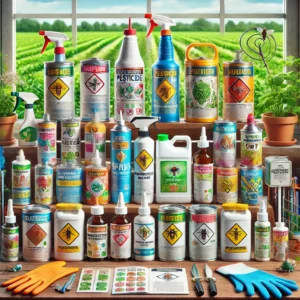In 2023, the number of pesticide residue notifications decreased in the European Union
In 2023, the Member States recorded 8,700 notifications in the Alert and Cooperation Network (ACN). As in previous years, the number of notifications of the Rapid Alert System for Food and Feed (RASFF) was the highest with 4,695 cases.

(Photo: AI)
In 2023, food safety was most threatened by pesticide residues not permitted in the European Union, or by exceeding the limit of permitted pesticide residues, microorganisms (e.g. salmonella) and mycotoxins (alphatoxins). The number of pesticide residue notifications was the highest (936), despite the fact that the number of cases decreased by 5.5% compared to 2022 and by 24% compared to 2021. The most notifications came in the fruit and vegetable product category (560), a significant number of which were related to border control. The cases were mainly linked to third countries, mostly India, Egypt and Turkey. The most common pesticides were chlorpyrifos, acetamiprid, ethylene oxide and 2-chloroethanol (Figure 1).
Compared to last year, the number of cases only increased by 19.1% in the case of chlorpyrifos, the number of notifications involving the other three active substances decreased significantly by 60%
In order to protect domestic producers, multiple inspections of problem countries are recommended, since by reducing the use of plant protection agents, additional costs may arise during cultivation, which can give imported products a market advantage. RASFF plays an important role in monitoring, withdrawing and recalling products that threaten food safety. In our country, these tasks and product recalls are performed by the National Food Chain Safety Office.
NAK/food.ec.europa.eu
Related news
Not a turnaround, but consolidation: an agricultural outlook for 2026
🎧 Hallgasd a cikket: Lejátszás Szünet Folytatás Leállítás Nyelv: Auto…
Read more >Related news
The GKI business climate index rose in February
🎧 Hallgasd a cikket: Lejátszás Szünet Folytatás Leállítás Nyelv: Auto…
Read more >After 10 million orders shipped, a new era begins at Kifli.hu: Hungarian CEO takes over
🎧 Hallgasd a cikket: Lejátszás Szünet Folytatás Leállítás Nyelv: Auto…
Read more >









